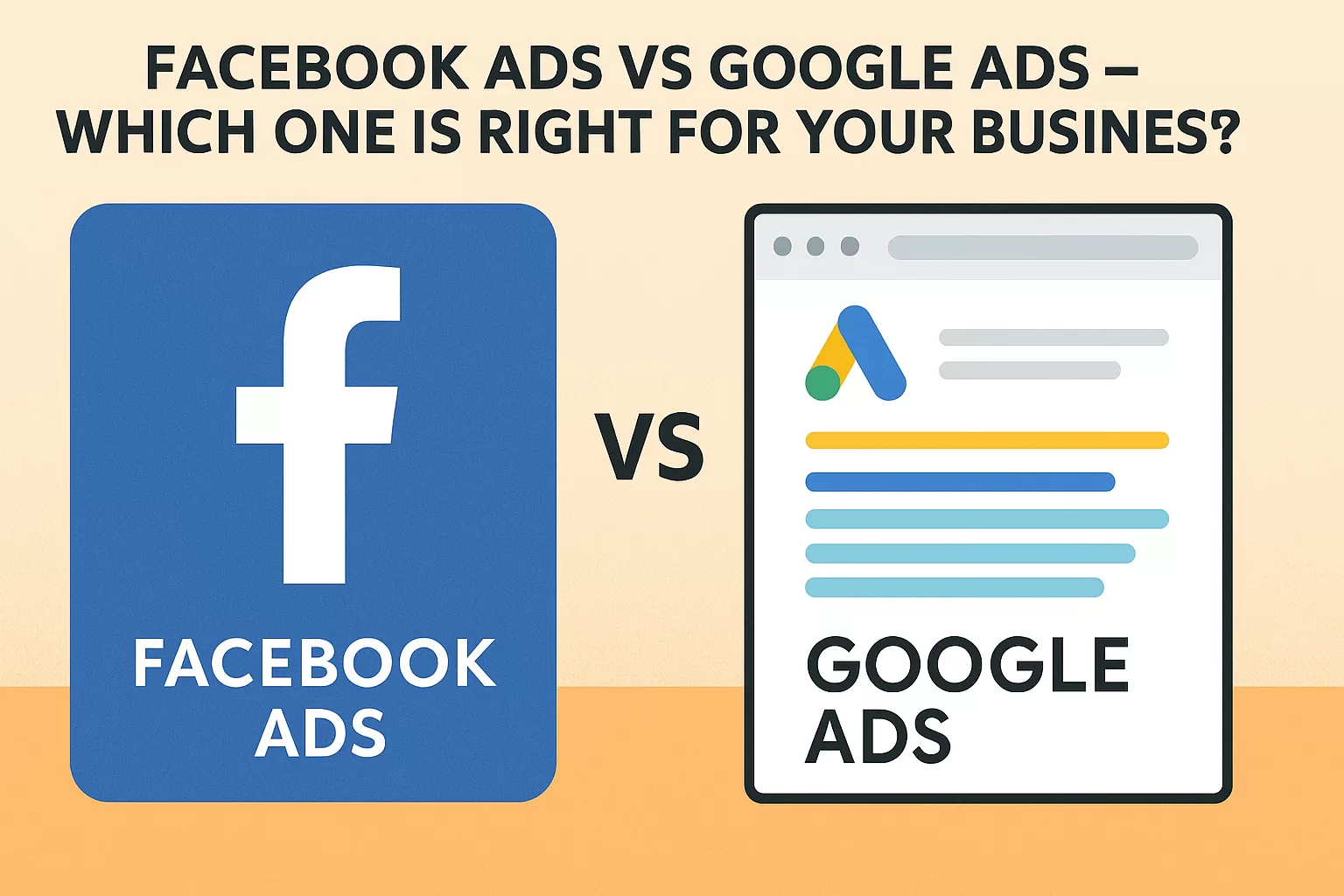
Table of Contents
- Introduction: Facebook Ads vs Google Ads – The Battle of the Titans
- What Are Facebook Ads?
- What Are Google Ads?
- Pros and Cons of Facebook Ads
- Pros and Cons of Google Ads
- Facebook Ads vs Google Ads: Key Differences
- When to Use Facebook Ads
- When to Use Google Ads
- Can You Use Both Platforms?
- Conclusion: Which One Should You Choose?
1. Introduction: Facebook Ads vs Google Ads – The Battle of the Titans
You’re ready to invest in paid advertising—but should you go with Facebook Ads vs Google Ads?
Both platforms are advertising giants, but each works very differently. Facebook Ads focus on social behavior and interest-based targeting, while Google Ads center around intent-based searches. So, which one is best for your business goals in 2025?
Let’s break it down.
2. What Are Facebook Ads?
Facebook Ads are paid promotions displayed across Facebook, Instagram, Messenger, and the Audience Network.
You can target users by:
- Demographics
- Interests
- Online behavior
- Location
- Life events
In short, Facebook is great at helping you reach people who might be interested in your offer—even if they’re not searching for it right now.
➡️ Learn more from Meta Ads Manager
3. What Are Google Ads?
Google Ads (formerly AdWords) are paid search and display ads shown across Google Search, YouTube, and the Google Display Network.
Google Ads are ideal when:
- People are actively searching for your product/service
- You want to appear above organic search results
- You need high-intent leads
Google uses keywords, bidding, and Quality Score to determine which ads show up for each search.
➡️ Read Google’s official Ads guide
4. Pros and Cons of Facebook Ads
Pros:
- Highly visual (great for images and videos)
- Cheaper CPC (cost per click) in many industries
- Excellent audience targeting
- Great for brand awareness and top-of-funnel traffic
Cons:
- Lower buying intent
- Ad fatigue happens fast
- Need creative testing frequently
- Performance depends heavily on visuals
5. Pros and Cons of Google Ads
Pros:
- High buying intent (people are searching for a solution)
- Quick ROI if done right
- Excellent for capturing demand
- Various ad types (search, shopping, display, YouTube)
Cons:
- Can be expensive (especially in competitive niches)
- Requires keyword research and bidding strategy
- Learning curve with match types, Quality Score, etc.
- Not great for brand awareness
6. Facebook Ads vs Google Ads: Key Differences
| Feature | Facebook Ads | Google Ads |
|---|---|---|
| Audience Targeting | Interest-based, behavior-based | Intent-based via keyword search |
| Ad Format | Visual (images, videos, stories) | Text-based + shopping + YouTube |
| Platform Reach | Facebook, Instagram, Messenger | Google Search, YouTube, Display Net |
| Cost Efficiency | Often lower CPC | Higher CPC, better ROI if optimized |
| Best Use Case | Awareness, engagement | Sales, leads, conversions |
7. When to Use Facebook Ads
Choose Facebook Ads if your goal is to:
- Build brand awareness
- Promote visual products (e.g., fashion, fitness)
- Retarget website visitors
- Grow your email list or offer free content
- Reach a broad audience with interest targeting
Example: A skincare brand launching a new serum could run story ads on Instagram targeting users interested in beauty products.
8. When to Use Google Ads
Go for Google Ads when you want:
- High-converting traffic
- To appear for competitive product/service keywords
- Quick ROI from search intent
- To advertise services like plumbing, legal advice, or online courses
Example: A local HVAC repair company can use Google Search Ads for keywords like “AC repair near me.”
9. Can You Use Both Platforms?
Absolutely—and you should.
Running both Facebook Ads and Google Ads together helps you cover both awareness and intent. Use Facebook Ads to introduce people to your brand and Google Ads to capture high-converting traffic.
A well-rounded strategy includes:
- Facebook Ads for brand building
- Google Ads for sales and lead generation
- Retargeting across both platforms
📌 Bonus Tip: Sync your retargeting audiences between platforms using tools like HubSpot or Zapier.
10. Conclusion: Which One Should You Choose?
So, which is better—Facebook Ads or Google Ads?
👉 If you're selling an impulse-buy product or want to build awareness, start with Facebook Ads.
👉 If you're offering a service people search for, go with Google Ads.
But here’s the truth: The best campaigns often combine both.
Need help creating a hybrid ad strategy? Contact us and let our digital marketing experts craft a winning campaign that suits your business.
Final Thought:
Both platforms work—just in different ways. The key is understanding your customer journey and aligning your ad platform with their buying behavior.
